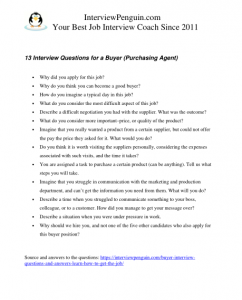Buyers (often also called purchasing agents, or purchasing managers) play an important role in every single business. You can expect a difficult interview, with a lot of behavioral (scenario-based) questions.
Your answers help the interviewers to understand how you’d handle different purchasing situations, and whether you have the right attitude to work–whether you have the employer and the final customer always on your mind. Let’s have a look at the questions you will face, and how to answer them.
Table of Contents
Why did you apply for this job?
This is a question of motivation. In a good answer you should actually cover two things: 1. Why you applied for a job of a buyer. 2. Why you applied for the job with them, and not with some other company.
You can start with the first one, saying that you enjoy doing what purchasing managers typically do, that you have strong analytical and negotiating skills, and believe you can be useful for an employer while working as a buyer. Saying this, you demonstrate the right attitude–thinking on the employer and their results, and not only on your own paycheck.
To the second one (why you applied for a purchasing agent job with them), you should point out that you have good understanding for their industry and for the products they purchase. But you can also say that you like their company, the working environment, their vision and final products, or anything else. The key is to clearly show that you did not apply with them by a chance (even if you did).
Why do you think you can become a good buyer?
You have a few options here. If you worked as a buyer before (and did a god job), you should refer to your past experience. Experience definitely helps in this profession.
You can also talk about any other relevant experience, any job when you used your negotiation skills, sales skills, analytical skills, or anything else relevant.
And what to say if you apply for your first job? Even in this case, you should trust in your abilities. Tell them that you have the analytical, accounting, and negotiation skills, and that you are eager to learn from more experienced colleagues (other buyers).
How do you imagine a typical day in this job?
Look at the job description for some help. In my experience, daily job of a buyer can vary a lot, depending on the industry, the number and variety of items they purchase, and also on the price per item.
Some buyers spend the entire day on the phone, and at their computer. Other purchasing agents will travel to meet the suppliers in person, do the quality check on place, and try to negotiate the best deals directly in the company.
Anyway, tell them that you imagine doing a lot of work, and are not afraid of making cold calls, visiting suppliers, and negotiating the best conditions of the deal. Show them that you like to be busy in work.
What do you consider the most difficult aspect of this job?
Perfect jobs do not exist. Even if we truly love what we do, we will find some tasks difficult, and we will be reluctant to do them.
In the work of the buyer this can be negotiating prices, cold calling, internal discussion with managers who have unrealistic expectations, market analysis, or anything else. The key is to always elaborate on your answer, saying that you understand the importance of the task, and therefore you’ll take care of it–even though you do not feel great about doing it.
Describe a difficult negotiation you had with the supplier. What was the outcome?
Everyone wants to make the most, to eat their fraction of the pie. Negotiations are not easy–if you have any experience under your belt, you for sure know that.
The key is to talk about the negotiations in a calm voice, clearly explaining the goals you had, and why you could not accept the initial offer the supplier made.
Doing this, you again show the right attitude (employer first) and also demonstrate your understanding for the business and job of a buyer (saying that you could not accept the offer since according to your calculations the price was not acceptable, and would result in a loss for your employer).
We live in a global world. If we struggle to sign a reasonable contract with one supplier, we can always try with the next one (unless we are in a very specific industry).
Special Tip: To know how to answer a question, and to come up with a great and genuine answer on a big day, are two different things. Have a look at an eBook I wrote for you, The Buyer Interview Guide. It includes multiple brilliant answers to 25 most common buyer interview questions, included the dreaded scenario-based questions. It also includes winning interview strategies that will help you connect with the hiring managers, and stand out in this interview. Thank you for checking it out!
What do you consider more important–price or quality of the product?
The right answer to this question is not straightforward. For example, if you worked for a chain of souvenir shops, you’d definitely look for the cheapest price. Quality does not matter for most city visitors. They just want their souvenirs, and in an ideal case they do not want to pay a lot of money for them.
On the other hand, if you worked as a purchasing manager for a stylish top-class restaurant, you’d go for quality. And you would not care much about the price, because price is not a concern of the people who dine in luxury restaurants. If the ingredients are expensive, the luxury restaurant will simply raise the price of particular dish. And the snobs will pay the price :).
Study the job offer carefully, and think whether price matters more, or quality. And if you are not sure, say that you’d always look for the best ratio of price and quality.
* May also interest you: Purchasing Manager interview questions.
Imagine that you really wanted a product from a certain supplier, but could not offer the pay the price they asked for it. What would you do?
Here you have a few options. For example, you can suggest offering them a long term partnership, in exchange for a better price. Or you can suggest doing a free promotion for them on your social platforms, mentioning that you use their products in the production process.
Other alternatives are exclusivity, ordering bigger quantity (if possible), offering barter services or free final products for their managers, etc. Everything depends on the budget, the importance of the deal, and the negotiating power you get from your employer.
The most important thing in an interview is to show that you won’t give up easily, that you will try your best to find the solution.
Do you think it is worth visiting the suppliers personally, considering the expenses associated with such visits, and the time it takes?
Once again, the answer to this question is not straightforward. Let’s say that you want to buy bio-quality cherry tomatoes for the luxury restaurant, and you will need them on a regular basis (that will typically be the case, since many dishes contain tomatoes).
In this case, it definitely makes sense to spend time and money and visit the farmer/distributor. This allows you to see the quality of the production, the conditions on the farm, and other things.
What is more, face to face contact still wins in business. You can’t secure the best deal over the phone, and personal relations are irreplaceable. If you are planning to buy tomatoes from someone for years to come, you should definitely visit them, even regularly.
Let’s look at another situation: the restaurant makes a special menu for one week–Greek menu. Your task is to get a high quality Greek olive oil and sheep feta cheese. This is a one-time purchase, since the restaurant won’t run the “Greek week” promotion more than once a year. Perhaps they won’t do it ever again. Therefor in this case it won’t be cost effective visiting the suppliers. Everything depends on the situation. Choose your answer accordingly.
Other questions you may get in your interview for a purchasing agent (buyer) job
- You are assigned a task to purchase a certain product (can be anything). Tell us what steps you will take.
- Imagine that you struggle in communication with the marketing and production department, and can’t get the information you need from them. What will you do?
- Imagine that the same product in our stores is selling less than in the stores of our competitors. What would you do?
- Describe your strategies for discovering the best products.
- Describe a time when you struggled to communicate something to your boss, colleague, or to a customer. How did you manage to get your message over?
- Describe your least successful purchasing experience.
- What do you consider more important–price, or quality of the product?
- Why should we hire you, and not one of the five other candidates who also apply for this position?
- ……
Conclusion, answers to all questions
If you are not sure how to answer the questions, or experience anxiety, have a look at a new eBook I wrote for you, the Buyer Interview Guide.
It includes multiple brilliant answers to twenty five most common buyer interview questions, and winning interview strategies. Check the eBook page for samples and see for yourself how it can help you gain confidence, impress the interviewers, and ace your next interview.
Thank you, and good luck!
Matthew Chulaw, Your personal job interview coach
* You can also download the list of most common questions (without answers) in .PDF format, to practice your interview answers anytime later:
Continue your interview preparation:
- Procurement Analyst interview questions.
- Inventory Manager interview questions.
- Salary negotiation tips – Negotiate the best possible price for the time and effort you’ll give to your employer.


